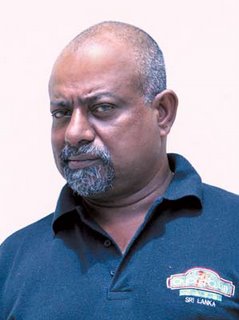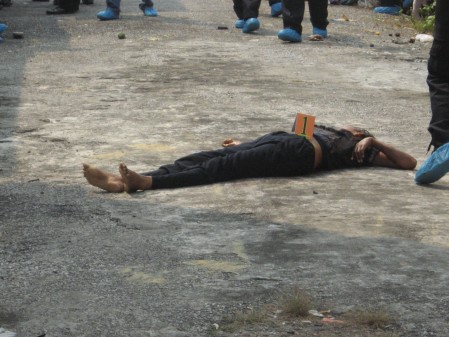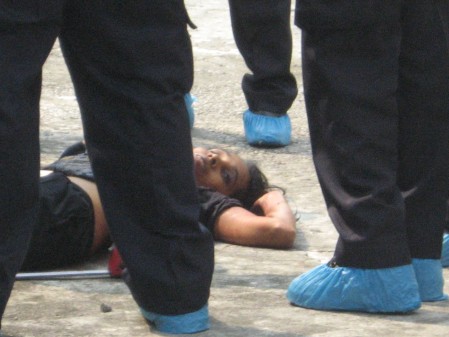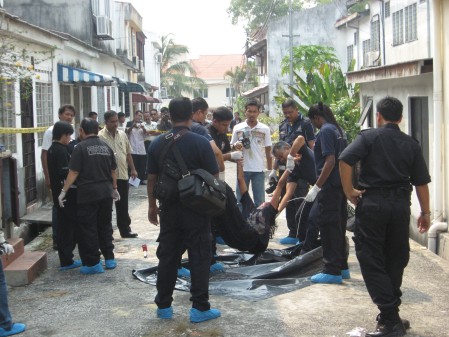– A few years back, I found this thesis writen by an unknown author on the web. I found it interesting and I believe the world should have a look at it. I am posting it purely for educational purposes and not to offend anybody. This paper was writen in 2005, if I am not mistaken. The author did an excellent job and all credit should go to him/her.
“A race of people is like an individual man: until it uses its own talent, takes pride in its history, expresses its own culture and affirm its own selfhood, it cannot fulfill itself” — Malcom X
The third largest ethnic group in Malaysia after the Chinese and the Malays are the Malaysian Indians. “Despite the fact that the Indians constitute about 8% of the country’s population of 22 million they own less than 2% of its national wealth. According to The Economist (22nd Feb 2003), “they make up 14% of its juvenile delinquents, 20% of its wife and child beaters and 41% of its beggars. They make up less than 5% of the successful university applicants.”
The story of the Indians has been a case of progressive deterioration from the time Malaysia became independent in 1957. The mass Indian (South Indian) immigration can be traced back to the early 20th century when the Britishers brought them to meet the labour force requirements in the colonial public services and in private plantations. While the bulk of the Tamils were employed in the plantations, the Sri Lankan Tamils and Malayalees were in supervisory or clerical positions. Of the North Indians, the Punjabis were in the police force, while the Gujaratis and Sindhis were in the business (mostly textiles). Despite the mass exodus of South Indians back to India after independence and after the racial riots of May 1969, the Tamils (South Indians) constitute about 80% of the total Indian community.
The Indians themselves are to some extent responsible for their present unenviable and ignominious status, and the policies of the Malaysian Government since independence had not been helpful either. Ignorance born out of poverty in the plantations resulted in many of them not getting citizenship which was offered in 1957 when Malaysia became independent. This prevented them from getting jobs.
A major setback for the Indian labour force was the steady closure of the rubber plantations giving way to tea and oil palm plantations. Their numbers started dwindling and they had competition from the illegal Indonesian immigrants. Unlike the Chinese who lay great emphasis on education, it was not given due importance by the Indian working class. The Tamil schools in the estates were often mere apologies and offered no opportunity for progress in higher education. The undue importance on Tamil education has also weakened the Indian community in competing with the indigenous Malays and the Chinese.
One of the major reasons for the low percentage of Indian origin students in the tertiary institutions in the country is the lack of merit and as a result, even the quotas set for the Indians remain unutilised. Despite their economic backwardness, the Indians were a peace loving people and were not involved in any racial riots either in May 1969 or later except for a few incidents of clashes on account of religious sentiments.
However in March 2001, the ethnic clashes between Indians and Malays in a village in the outskirts of Kuala Lumpur, brought into focus the plight of the Indian community in Malaysia. The incident has since been forgotten on the assumption that the clashes resulted on account of poor living conditions in the villages than the racial differences. There has been no introspection of this incident by the Government or by the Malaysian Indian Congress (MIC), the leading political party of the Indians. The MIC, a constituent of the coalition government at the center since independence does not have much political clout and has not been able to do anything substantial to improve the lot of the Indians.
Datuk Seri Samy Vellu is the President of the MIC since 1979. Charles Santiago, a Malaysian economic consultant, in an interview on 5 Feb. 2003 to Radio Australia (Asia Pacific) said “ He (Samy Vellu) is in, very much in control of the party, and the party’s run almost on feudal organisation where almost all the decisions are made by the President himself. A lot of Indians are critical of MIC’s role in the coalition government, the Indian middle class dose not want to associate itself in the MIC and largely making the MIC a working class party.” This in brief sums up the state of affairs of the leading Indian party and its leader in the coalition government.
On January 9, 2003, India celebrated the Parvasi Bhartiya Divas (Day of the Persons of the Indian origin and Non resident Indians), and ten eminent persons of Indian origin were given the Indian Diaspora award. Datuk Seri Samy Vellu was one among them. One wonders whether Government of India made any enquiry about Datuk Seri Samy Vellu’s contributions to the Malaysian Indians. Referring to the grand mela organised by Government of India for the people of Indian origin, Dr. P. Ramasamy of Malaysia in a letter to the Far Eastern Economic Review (Feb., 27, 2003) said “like previous (Indian) governments it continues to betray the interest and welfare of million of Indians locked in poverty and misery overseas.
It wants to develop the links with the wealthy segments of the overseas Indian community while turning a blind eye at the less savory side of the diaspora.” The Malaysian Government policies since independence have also been consistently to the detriment of the non-Malays in general though the Indian community seems to be most hard hit. The first major step was the introduction of work permits for the non-citizens when a majority of Indian workers had not obtained Malaysian citizenship.
Subsequently in 1971 with its New Economic Policy, the Government championed the cause of the Malays by the policy of “Bhumiputras”(sons of the soil). The Bhumiputras were to have a major share in the public sector while the private sector remained secure with the Chinese. The introduction of quotas for the different races in the educational institutions has also adversely affected the Indian community. The New Development Plan for the period 1991-2000 was also designed to achieve the socio-economic upliftment of the Bhumiputras and the MIC’s efforts to place the Indians in a separate ethnic grouping seems to have made no headway with the Malaysian Government.
Being a minority, they do not have the numerical strength to exert any political influence nor do they make any significant contribution to the national economy. The ruling government’s apathy to the Indians is therefore understandable. But what about the leaders like Samy Vellu and what has been their contribution towards the alleviation of poverty of the poor people of Indian origin? There has been none.
The plight of the Malaysian Indians can be attributed in part to a dependency mindset nurtured on the plantations and this has to be overcome. There is a significant and emergent need for a change in the leadership of the Indian parties in power to take up the cause of the Indians to get them their due rights free from racial discrimination and have full access to jobs and education. As proposed in the Conference on the “The Malaysian Indian in the new millennium –rebuilding the Community” held at Kuala Lumpur in June 2002, problems such as the loss of self esteem within the community, external derision and the absence of unifying factors to forge a single identity have to be addressed by the leading cultural, social and political institutions and embark on an action plan. However the effort has to come from within the community and has to be sustained as such deliberations have been there in the past also with no major impact on the Government.
Till now the Indian Government has done very little in this regard. Since the Government of India has now embarked upon a programme for interacting with the Overseas Indians, especially with the affluent sections in the Western nations, it should also look after the interests of the under privileged Overseas Indians in countries like Malaysia. As part of the “ Look East” policy interaction with Malaysia especially in the field of education will be beneficial to the Indian community. The High Commission of India in Kuala Lumpur used to award scholarships to the poorer sections of the Indian community in the late 80’s. The system , if continuing, can be augmented further to help the community. Setting up IIT type institutions and exchange programmes can also be considered. There is need to make a proper selection and not go by the recommendations of the big wigs.
As of now the problems faced by the Malaysian Indians are not being attended to by the Malaysian Government nor does the community have the economic or political clout to demand their redressal. One wonders whether the Indians belong to the third major race or to a third class race in the country. We are not aware what recommendations the High Power Committee of Government of India ( really high powered with extensive tours all over the world, five star hotels and lavish receptions etc) have made for the poorer sections of the Indian community abroad. Acceptance of the dual citizenship for a selected class is not going to be helpful either for this hapless lot.
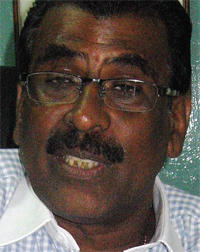 “Today’s MIC needs a different breed of leaders. We have many young professionals and successful Indian businessmen out there that are staying away from politics for obvious reasons. We need to bring them in. The party is in need of some fresh faces,” he explained. When asked about the defeat of deputy president hopeful Datuk S. Subramaniam, Karunanidhi said: “The delegates should have compared Koperasi Nesa Pelbagai Berhad (NESA), run by Subramaniam and Maika Holdings. That would have given them a clearer picture. One is paying dividends as promised and another is in shambles.
“Today’s MIC needs a different breed of leaders. We have many young professionals and successful Indian businessmen out there that are staying away from politics for obvious reasons. We need to bring them in. The party is in need of some fresh faces,” he explained. When asked about the defeat of deputy president hopeful Datuk S. Subramaniam, Karunanidhi said: “The delegates should have compared Koperasi Nesa Pelbagai Berhad (NESA), run by Subramaniam and Maika Holdings. That would have given them a clearer picture. One is paying dividends as promised and another is in shambles.


